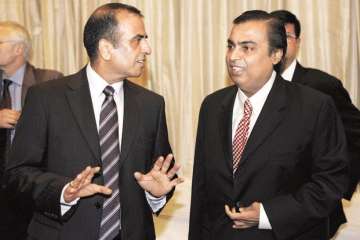Reliance Jio’s move to increase tariffs has come as much-needed reprieve for incumbent mobile telecom firms which have been bleeding as a result of the new entrant’s disruptive prices and freebie offers. Last week, Jio reduced the validity period on its popular Rs 399 plan from 84 days to 70 days, implying a 20 per cent price increase. It also introduced a new Rs 459 plan with 84-day validity, a 15 per cent price increase.
Jio’s move has come as a welcome surprise for incumbents such as Bharti Airtel and Idea Cellular. On Monday, share prices of Airtel jumped to a more than eight-year high while Reliance too hit a record on the first day of trading since Jio's announcement last week of new high-end data tariffs.
Reliance shares jumped as much as 3.8 percent on Monday to hit a fresh all-time high, before closing 3.3 percent higher.
Bharti Airtel led gains on the broader NSE index, climbing as much as 5.8 percent to hit its highest level since May 2009.
Idea Cellular Ltd too surged as much as 8.8 percent to touch its highest since July 25, while Reliance Communications Ltd rose as much as 9.5 percent.
Analysts saw the stocks rallying as a sign that pricing in the telecom sector was heading for some normalcy after the disruption is saw with the entry of Reliance Jio in 2016.
A research report by UBS saw the increase in tariffs by Jio as a positive for the sector.
"The price increases are positive for incumbents, who followed Jio's prices in the past six months and will now likely be able to raise prices as well. Jio's large and increasingly sticky subscriber base of over 100 million will incentivise the company to emphasise monetization of subscribers as much as acquiring new subscribers."
It is expected that telecom sector's average revenue per user (Arpu) will bottom out in FY18 and grow by 3 per cent in FY19 and 5 per cent in FY20.
The increase in tariffs also expected to expand Jio's average revenue per user by up to 20% and is a positive for the telecom sector which is seeing rapid consolidation, a report by Philip Capital said.
The Credit Suisse report, however, noted that tariffs effective after Jio’s increase still stand 65 per cent lower than an average smartphone customer was paying before its launch. This, it said, would continue to put pressure on average revenue per user Arpu of incumbents.
"At 20 per cent increase every three months, we need at least 18 months for the smartphone customer segment to return to pre-Jio levels of Arpu. With over 65 per cent discount still running, we expect a downward pressure on Arpu for incumbents to continue," it said.
The predictions and analyses, though mixed, offer hope to incumbents like Airtel, Vodafone and Idea of moving towards better pricing discipline.
Jio’s predatory pricing had severe adverse impact on the revenues of incumbent operators. Bharti Airtel saw its profit plummeting 75 per cent in the April-June quarter while Idea Cellular reported a third consecutive quarterly loss.
Latest Business News

